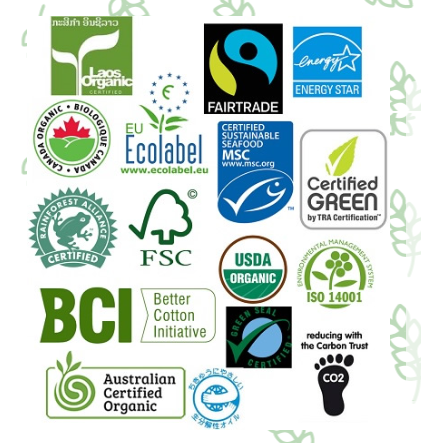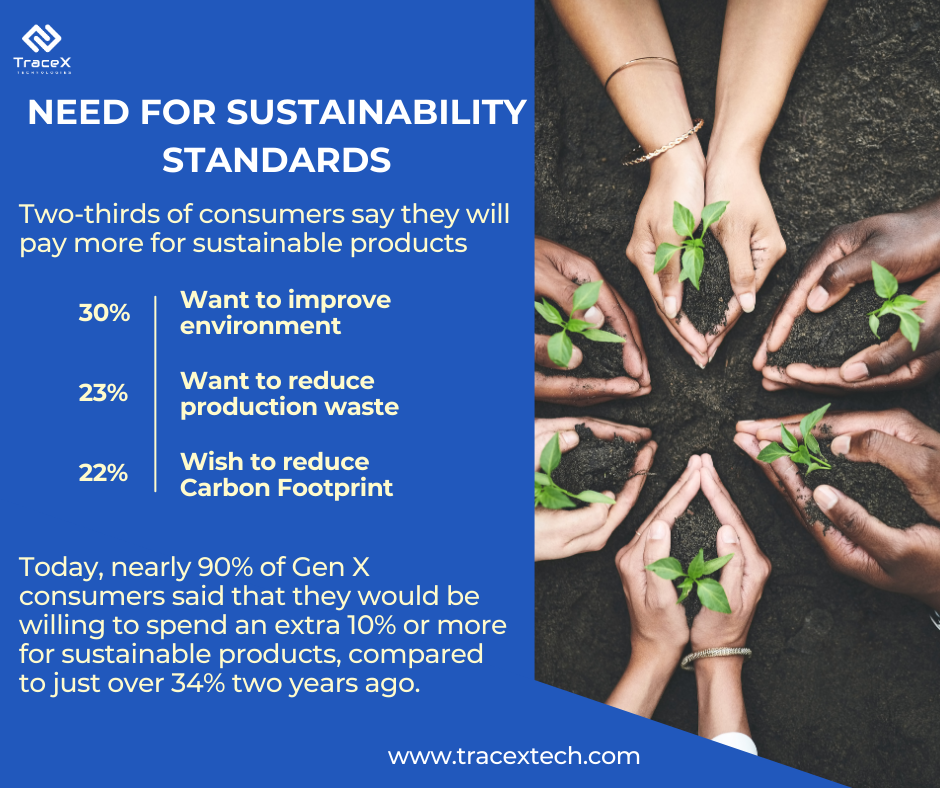Contact: +91 99725 24322 |
Menu
Menu
Quick summary: Unlock the world of Voluntary Sustainability Standards (VSS) with our comprehensive blog. Discover the types, significance, and impact of VSS on global sustainability efforts. Dive into the complexities and benefits of adhering to these standards in various industries. Get insights into how VSS contribute to creating a more sustainable future for our planet.

Voluntary Sustainability Standards (VSS) represent a pivotal framework in the global effort towards fostering sustainable practices across various industries. These standards, often developed by non-governmental organizations (NGOs) or industry associations, outline criteria and guidelines aimed at improving social, environmental, and economic performance throughout supply chains. By adhering to VSS, companies demonstrate their commitment to ethical production, environmental stewardship, and social responsibility.
A recent study by NielsenIQ found that 78 percent of US consumers say that a sustainable lifestyle is important to them.
As the demand for sustainable products continues to rise, understanding VSS becomes increasingly essential for businesses seeking to remain competitive and aligned with evolving consumer values. In this blog, we delve into the intricacies of Voluntary Sustainability Standards, exploring their significance, implementation, and impact on global sustainability efforts.
Voluntary Sustainability Standards (VSS) are a collection of standards, criteria, or requirements that firms, organisations, or industries voluntarily embrace to promote ecologically and socially responsible behaviours throughout their supply chains. These standards address issues such as environmental impact reduction, fair labour practices, social responsibility, and ethical sourcing.
As worries about environmental deterioration, social inequity, and resource depletion mount, sustainability has become increasingly important across a wide range of industries. Agriculture, manufacturing, textiles, energy, and tourist industries understand the value of incorporating sustainable practices to reduce negative impacts, improve reputation, comply with regulations, and meet consumer demand for eco-friendly products and ethical production techniques.
VSS encourage firms to embrace sustainable practices voluntarily, beyond legislative constraints. VSS contributes to the standardisation of sustainable processes, promotes transparency, and fosters customer trust by establishing explicit norms and requirements. They help enterprises committed to sustainability gain market access, push innovation towards greener solutions, and foster stakeholder engagement to effectively address global sustainability concerns. Overall, VSS play an important role in promoting sustainability goals across industries by encouraging responsible production and consumer behaviours.

Some well-known voluntary sustainability standards include:
Forest Stewardship Council (FSC): FSC certification ensures that forest products come from responsibly managed forests that provide environmental, social, and economic benefits.
Rainforest Alliance: The Rainforest Alliance certification focuses on promoting sustainable agriculture, forestry, and tourism practices that conserve biodiversity and improve livelihoods.
Fairtrade International: Fairtrade certification ensures that producers in developing countries receive fair prices and premiums for their products, along with support for sustainable farming practices and community development.
Organic Certification: Various organic certification bodies, such as the United States Department of Agriculture (USDA) Organic and the European Union Organic Regulation, certify products produced using organic farming methods that avoid synthetic pesticides, fertilizers, and genetically modified organisms (GMOs).
Marine Stewardship Council (MSC): MSC certification ensures that seafood products come from sustainable and well-managed fisheries, helping to protect marine ecosystems and support responsible fishing practices.
Carbon Trust Standard: The Carbon Trust Standard certifies organizations for measuring, managing, and reducing their carbon emissions, demonstrating their commitment to addressing climate change.
Roundtable on Sustainable Palm Oil (RSPO): RSPO certification ensures that palm oil is produced sustainably, without causing deforestation, habitat destruction, or human rights abuses.
Ensure your business aligns with eco-conscious practices.
Explore the world of sustainability certificates and standards
Consumers are shifting their spending toward products with ESG-related claims.
Environmental criteria in sustainability standards are designed to reduce environmental impacts throughout the product’s lifecycle. This involves lowering greenhouse gas emissions, conserving natural resources, reducing pollution and waste output, safeguarding biodiversity, and encouraging renewable energy and sustainable land use practices. Environmental standards attempt to guarantee that items and processes are environmentally responsible and help to preserve and restore ecosystems.
Social criteria focus on the social dimensions of sustainability, such as labour rights, human rights, community engagement, and equal economic opportunity. These criteria frequently include fair wages and working conditions, gender equality, child labour prohibition, access to education and healthcare, indigenous rights protection, and community development activities. Social criteria seek to maintain human dignity, promote social justice, and enhance the well-being of workers, communities, and marginalized groups affected by production processes.
Economic criteria aim to promote economic sustainability and resilience. This includes guaranteeing fair and equitable sharing of economic advantages along the supply chain, assisting smallholder farmers and local producers, encouraging economic diversification and value addition, and promoting long-term economic viability. Economic criteria include affordability, accessibility, and economic empowerment, with the goal of creating value while balancing economic growth with social and environmental factors.
The requirements for governance and transparency include the establishment of clear rules, procedures, and systems to assure compliance with sustainable standards while also encouraging accountability and transparency. This involves public reporting, stakeholder participation, independent auditing and certification, grievance procedures, and ethical corporate practices. Governance and transparency requirements strive to develop confidence, foster integrity, and ensure stakeholders have access to accurate information about the social and environmental, and economic performance of products and processes.

Overall, adhering to sustainability norms provides tangible advantages to both the environment and communities, encouraging long-term environmental stewardship and social well-being.
Technological improvements play an important role in facilitating the implementation of Voluntary Sustainability Standards (VSS) by improving transparency, traceability, and data management throughout supply chains. Blockchain, IoT, and AI technologies offer real-time monitoring and tracking of products and resources, ensuring sustainability from sourcing to distribution. Blockchain, for example, can provide immutable records of transactions and certificates, increasing trust and accountability in supply chains.
IoT devices can collect data on environmental conditions, resource utilisation, and labour practices, allowing for performance monitoring and improvement activities. AI systems can analyse massive volumes of data to detect patterns, optimise processes, and predict dangers, hence facilitating decision-making and continual improvement in sustainable practices. These technological advancements empower businesses to enhance transparency, efficiency, and accountability in implementing VSS, driving progress towards more sustainable and responsible supply chains.
Blockchain drives accountability, transparency, and ethical practices across industries.
Explore the transformative role of blockchain in advancing sustainability goals
Blockchain traceability solutions from TraceX play a pivotal role in supporting voluntary sustainability standards by bolstering transparency, accountability, and trust within supply chains. These solutions offer transparent record-keeping through immutable ledgers, ensuring stakeholders can easily verify compliance with standards such as Fairtrade or Rainforest Alliance by tracing product origins and movements. Moreover, they facilitate the verification of sustainable practices, allowing producers to provide tangible proof of adherence to criteria like organic cultivation or fair labor practices.
Real-time supply chain visibility enables accurate identification and segregation of certified products, minimizing the risk of contamination. By leveraging blockchain, companies can build consumer trust through transparent information access, empowering consumers to make informed decisions. Furthermore, blockchain streamlines audit and certification processes, expediting verification and reducing administrative burdens. Overall, TraceX’s blockchain traceability solutions promote integrity and sustainability, aligning supply chains with voluntary standards to foster responsible production and consumption.
The International Organisation for Standardisation (ISO) is one of the international organisations that promote Voluntary Sustainability Standards (VSS). ISO sets globally recognised standards for a variety of industries, including environmental management (ISO 14001) and social responsibility (ISO 26000). The United Nations Conference on Trade and growth (UNCTAD) encourages poor nations to implement VSS to improve market access and long-term growth. The International Trade Centre (ITC) also provides technical help and capacity-building support to firms and governments in order to comply with VSS and improve their competitiveness in global markets.
Cross-border collaborations and initiatives help governments and regions harmonise and recognise sustainability standards. For example, the US International Trade Administration works with foreign governments and industry players to encourage the use of VSS and enable trade in sustainable products. The Global Platform for Sustainable Natural Rubber (GPSNR) brings together stakeholders throughout the whole rubber value chain to create and implement sustainability standards and practices. Many VSS activities are driven by a commitment to the United Nations Sustainable Development Goals (SDGs).
VSS contribute to the achievement of several SDGs, such as responsible consumption and production (SDG 12), decent work and economic growth (SDG 8), and climate action (SDG 13). By promoting sustainable behaviours and tackling social and environmental issues, and economic challenges, VSS play a vital role in advancing the broader agenda of sustainable development outlined by the SDGs.
Finally, Voluntary Sustainability Standards (VSS) play an important role in driving industry-wide sustainability by supporting responsible behaviours, increasing transparency, and encouraging collaboration across supply chains. Organisations can use VSS to undertake assessments, formulate strategies, allocate resources, and engage stakeholders. Collaboration opportunities for industry-wide sustainability projects abound, providing collaborative methods to addressing common challenges and driving systemic change. Organisations who advocate for widespread acceptance and acknowledgment of VSS can help to advance global sustainability goals, promote sustainable consumption and production habits, and have a positive influence on the environment, communities, and economy. Embracing VSS not only boosts competitiveness and reputation, but it also positions organisations as sustainability leaders, ready to succeed in a constantly changing global marketplace centred on social and environmental responsibility.
